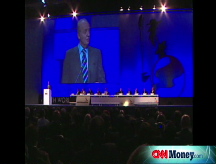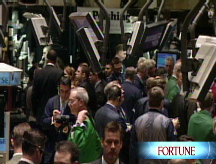Wall Street: The bear is back
Dow and Nasdaq end at bear market levels, down more than 20% from October highs. Stocks fall on record oil prices, GM's downgrade and worries about the June jobs report.

NEW YORK (CNNMoney.com) -- Stocks slumped Wednesday, with the Dow and Nasdaq ending in bear market territory on record oil prices, a 15% slump in GM stock and worries ahead of the June jobs report and ECB interest-rate decision, both due Thursday.
The Dow Jones industrial average (INDU) lost 1.5%, led by a 15% slide in GM shares.
The broader Standard & Poor's 500 (SPX) index fell 1.8%, the tech-heavy Nasdaq composite (COMP) slid 2.3% and the Russell 2000 small-cap index retreated 2.8%.
Both the Dow and the Nasdaq closed at levels that meet the technical definition of a bear market, defined as a drop of at least 20% off the cyclical highs - in this case the highs from last October.
The Nasdaq previously fell into bear market territory in March, when it fell 24% off its highs.
The Dow Jones Transportation average lost 4.3%, falling to a more than 3-month low, with all 20 components sliding, led by Continental Airlines (CAL, Fortune 500), which slumped over 11%. AMR (AMR, Fortune 500) shares fell 4.7% after unit American Airlines said it may cut 900 flight attendant jobs as it contends with surging fuel prices
Transportation names tend to weaken when oil prices are up as investors punish stocks that take a direct hit from higher fuel prices.
Stocks were lower in the morning on rising oil prices, a weak dollar and reports that showed improved factory orders and worse private sector employment. Stocks managed to cut losses in the mid afternoon as the financial sector rallied, but the recovery attempt was short lived.
"I think you're seeing a continuation of the downward trend and maybe some fear about tomorrow's news," said Joseph Saluzzi, co-head of equity trading at Themis Trading. Thursday brings the June employment report and an expected interest-rate hike from the European Central Bank.
Should the ECB boost rates, that would likely lift the euro and drag on an already hard-hit dollar, which in turn would pressure oil prices. Dollar-traded commodities such as oil have been on the rise partly because of the greenback's weakness.
All financial markets close early Thursday and are closed altogether Friday for the Fourth of July holiday, which could be creating jitters.
"I think there are some worries ahead of the long weekend and so people want to square up," said Bill Stone, chief investment strategist at PNC Financial Services Group.
He said that at the moment, investors are looking for most news to be bad news - and that perspective is weighing on market sentiment.
After the close, Nvidia (NVDA) warned that current-quarter sales won't meet forecasts due to slower global demand. The graphics chipmaker also warned that its gross margin - key measure of profitability - won't meet forecasts. Shares slumped 20% in after-hours trade.
GM sinks, market follows: On Tuesday, GM (GM, Fortune 500) surprised the market by reporting that June sales fell 18% versus expectations for a steeper drop of 25%. That sent GM shares higher and helped the broader stock market bounce back.
But on Wednesday, Merrill Lynch downgraded the automaker, sending the stock down 15% to end at a more than 54-year low of just under $10.
Merrill cut the automaker's rating to "underperform" from "buy" and cut the automaker's price target to $7 per share from $28 per share, saying that the company is burning through cash and that bankruptcy is "not impossible."
Oil prices rise: U.S. light crude for August delivery rose $2.60 to settle at a record $143.57 a barrel on the New York Mercantile Exchange. Prices have already risen more than 50% this year in response to tight supply and tensions in the Middle East. Oil hit an electronic trading record of $144.32 after the close of the regular session.
The government reported Wednesday morning that crude supplies dropped by 2 million barrels last week, beating forecasts for a drop of 1.2 million barrels. Gasoline stocks rose by 2.1 million barrels, beating forecasts for a drop of 500,000 barrels. Distillates, used in heating oil, rose by 1.3 million barrels versus forecasts for a rise of 2.4 million barrels.
On Tuesday, the International Energy Agency said that global supply will remain tight, despite higher prices and less demand in the United States and Europe, with demand from developing countries surging over the next five years.
The national average price for a gallon of regular unleaded gas rose to a record $4.092 from the record $4.087 the previous day, according to AAA. (Full story).
Corporate news: Select financial stocks managed to buck the downward trend Wednesday after both Deutsche Bank (DB) and UBS (UBS) said that they would not need to raise additional capital. Deutsche Bank also said it would post a second-quarter profit.
Microsoft (MSFT, Fortune 500) has approached other media companies about the possibility of partnering to buy Yahoo (YHOO, Fortune 500)'s search business, according to a Wall Street Journal report. News Corp. and CNNMoney.com parent Time Warner were among the companies approached, the paper said. In May, Microsoft abandoned its $47.4 billion bid for Yahoo. (Full story)
Blockbuster (BBI, Fortune 500) said its withdrawing its more than $1 billion bid for Circuit City (CC, Fortune 500) because of poor market conditions. Circuit City sales have plummeted this year in response to the sluggish economy and consumer spending environment. Shares of Blockbuster rallied 5.6% on the news, while Circuit City shares slumped 9%. (Full story)
UnitedHealth Group (UNH, Fortune 500) warned that 2008 profit won't meet previous forecasts due to higher costs and weaker business. The company also said that it will cut around 4,000 jobs. Separately, the healthcare company said it will pay $912 million to settle two class-action lawsuits that relate to its stock-options practices.
Alcoa (AA, Fortune 500) led the list of stocks in the materials sector seeing declines, falling 6.8%. Materials was the second-best performing S&P sector in the first half of the year, following energy.
In other news, Starbucks (SBUX, Fortune 500) said late Tuesday that it will close 600 stores, or 8.5% of its 7,100 stores, expanding an initial plan to close 100 stores. The coffee chain has been struggling amid the weak economy. Shares tiptoed higher. (Full story).
Economic news: Factory orders rose 0.6% in May, after rising a revised 1.1% in April, the government reported. That was above economists' forecasts for a rise of 0.5%, according to Briefing.com, but was the weakest showing since February, reflecting limp demand for autos, heavy machinery and steel. (Full story).
Private sector employment slumped in June, with employers cutting 79,000 jobs from their payrolls after adding a revised 25,000 in May, according to payroll services firm ADP. Economists surveyed by Briefing.com expected employers to cut 20,000 jobs, on average.
The report exacerbated jitters about Thursday's big government employment report. That report was expected to show that employers cut 60,000 jobs from their payrolls in June after cutting 49,000 in the prior month. The unemployment rate, generated by a separate survey, is expected to have fallen to 5.4% from 5.5% the previous month. (Full story).
Other markets: In currency trading, the dollar fell versus the euro and the yen.
In the bond market, Treasury prices rose, lowering the yield on the benchmark 10-year note to 3.97% from 4.00% late Tuesday. Bond prices and yields move in opposite directions.
COMEX gold for August delivery rose $2 to settle at $946.50 an ounce. ![]()





